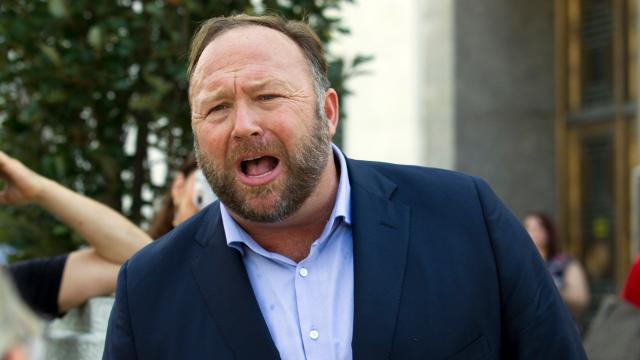An email chain between Facebook and Instagram executives discussing an anti-Semitic post on Alex Jones’ Instagram account and obtained by Business Insider and Britain’s Channel 4 News illustrates the kind of extreme lengths that the company goes to in order to avoid passing judgement on what’s right in front of their faces.
They also show that Instagram is considering following the lead of other social networks with an outright ban on Jones.
The discussion, which Business Insider said included input by more than 20 of the companies’ top brass, centred on a since-removed post shared to Jones’ account on March 14.
As Business Insider noted, the image by artist Mear One is a variation of a 2012 mural that sparked renewed controversy last year following resurfaced comments of support for it by British Labour Party politician Jeremy Corbyn. (Corbyn apologised for his 2012 comments last year and called the imagery “deeply disturbing and anti-Semitic”.)
Hashtags tacked onto Jones’ post included phrases such as #resistglobalism and #globalist, two terms that can function as anti-Semitic dog whistles. According to a previous report by Business Insider, the Instagram post fuelled anti-Semitic rhetoric by commenters who interpreted the figures surrounding a Monopoly board in the image as being Jewish.
In emails between executives and Instagram and its parent company Facebook, the company’s leaders reportedly debated whether the image should be taken down on the basis that it violated its community standards and said that the company had privately discussed designating Jones as a hate figure, which would result in him being banned from Instagram.
While some on the thread initially said, according to reports, that the post did not violate the Facebook’s community standards, other executives worried that keeping the post live undercut the company’s recently announced ban on white nationalism and white separatism content.
“This image is widely acknowledged to be anti-Semitic and is a famous image in the UK due to public controversy around it,” one executive commented. “If we go back and say it does not violate we will be in for a lot criticism.”
Facebook previously yanked four pages associated with Jones and InfoWars last year, claiming they violated its “hate speech and bullying policies”.
Following Business Insider’s report on the emails, Jones shared a nearly six-minute video to Instagram that claimed he was being “framed” and that he would pursue lawsuits against both Business Insider as well as the social media platform if his account was yanked.
Jones repeatedly claimed that the post was not anti-Semitic and that he was being framed by “Smolletts”, a reference to actor Jussie Smollett and a euphemism for what he claimed was a network of commenters simultaneously posting and reporting content in an effort to get him kicked off the platform.
As indicated in the Facebook email thread, comments on the post that violated Facebook’s community standards amounted to roughly four per cent of the total number, according to Business Insider. Jones claimed that this figure was somehow designed to signal to his critics that they should make fake, racist or anti-Semitic comments to get him kicked off the platform.
Facebook did not immediately respond to a request for comment from Gizmodo.
A company spokesperson told Business Insider that “deciding what content stays up and who can use our platforms is one of the hardest decisions we have to make as a company and it’s sensible that we take the time to get it right”. The spokesperson said the company was looking into how best to “enforce our policies against him as an individual”.
It’s understandable that a company the size of Facebook would want to have a system in place for deciding what content does or doesn’t violate its rules.
But the process outlined in this instance shows that when there are risks of public controversy the social network is entirely capable of looking at something that’s clearly anti-Semitic and making the decision to follow the spirit of its rules against hate speech.
Figures such as Jones really aren’t worth the headache, and until Instagram decides to join its parent company with a full ban on the conspiracy theorist it’ll just have to keep explaining itself.
